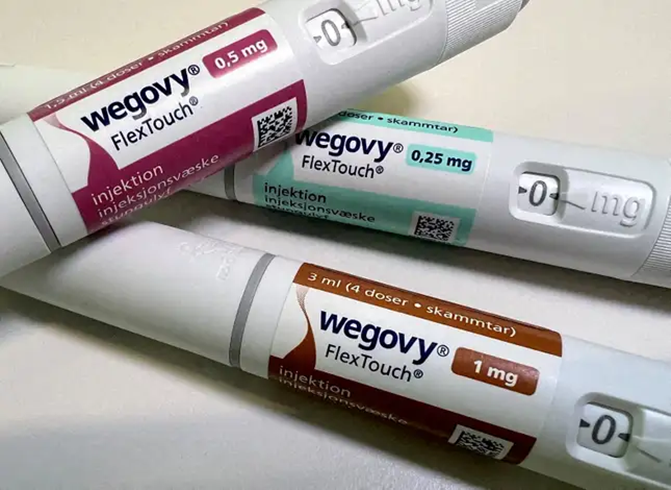Input
Changed
The Rising Tide of Obesity: A Global Public Health Challenge The Pharmaceutical Boom: Weight-Loss Drugs as a Lucrative Market Balancing Medical Solutions with Long-Term Prevention

The Rising Tide of Obesity: A Global Public Health Challenge
In recent years, the global surge in obesity rates has reached alarming levels, prompting experts to call it a "monumental social failure." A new study has highlighted the grim reality that more than half of the world’s adult population will be classified as overweight or obese by the year 2050. The statistics are not just a wake-up call for public health officials but also for investors, pharmaceutical companies, and the food industry. With obesity rates soaring, the pressure on healthcare systems is mounting, and the economic implications of this global health crisis are far-reaching. Yet, amid this crisis, there is also a promising market emerging in the form of weight-loss drugs, such as Wegovy, Zepbound, and Saxenda, which are projected to see massive growth in the coming decades.
Obesity has become one of the most pressing health challenges of the 21st century. According to recent reports, more than half of adults worldwide are expected to be overweight or obese by 2050. This staggering statistic underscores a dramatic shift in global health trends, with obesity rates increasing at an unprecedented rate. The causes of this epidemic are multifaceted, involving factors such as poor diet, sedentary lifestyles, environmental influences, and even socio-economic conditions. In many countries, the rapid rise of processed foods, high-calorie diets, and a growing reliance on technology has contributed to the problem.
The implications of this crisis are far-reaching, as obesity is a major risk factor for a wide range of health issues, including cardiovascular diseases, type 2 diabetes, certain types of cancer, and mental health conditions. Beyond the individual health risks, the economic burden of obesity on healthcare systems is expected to grow exponentially, as more people require treatment for obesity-related conditions. This growing public health crisis presents a complex challenge for governments, healthcare providers, and communities, all of whom must find ways to address the root causes of obesity while also managing its consequences.
While the increase in obesity rates is a public health catastrophe, it has also opened up significant business opportunities for the pharmaceutical industry. As more people struggle with weight management, the demand for effective weight-loss treatments has skyrocketed. Among the most notable pharmaceutical advancements in this area are the weight-loss drugs Wegovy, Zepbound, and Saxenda. These drugs have already proven to be highly effective in helping individuals lose weight, and as obesity rates continue to rise, the market for these treatments is poised for explosive growth.
Wegovy, developed by Novo Nordisk, has been one of the most successful weight-loss drugs to date. It has garnered attention for its effectiveness in helping patients shed significant amounts of weight, and its success has contributed to a surge in the company's stock price. Wegovy works by mimicking a hormone that regulates appetite, effectively reducing hunger and helping patients control their calorie intake. Its popularity has been fueled by its relatively low side-effect profile and the growing acceptance of weight-loss treatments as part of the broader healthcare conversation.
However, Wegovy is not the only player in the weight-loss drug market. Zepbound, developed by a rival pharmaceutical company, has emerged as a strong contender to challenge Wegovy’s dominance. Zepbound is similar in its mechanism of action but has been positioned as a more affordable alternative, which could give it a competitive edge in the rapidly growing market. As the demand for weight-loss drugs continues to climb, the competition between Wegovy, Zepbound, and other pharmaceutical treatments is likely to intensify, creating a dynamic marketplace for weight-loss solutions.
With obesity rates expected to continue rising, the demand for weight-loss drugs will undoubtedly increase. The pharmaceutical industry is well aware of this potential, and companies are already positioning themselves to capitalize on this growing market. The increasing number of overweight and obese individuals around the world means that more people will be seeking out treatments to manage their weight, whether through lifestyle changes, surgical interventions, or pharmaceutical solutions.
The promising future of drugs like Wegovy and Zepbound is directly tied to the growing prevalence of obesity. As more people struggle with weight management, the pharmaceutical market for obesity treatments will expand, potentially reaching billions of dollars in revenue. This shift in demand represents a significant opportunity for companies like Novo Nordisk, who are already leading the way with successful weight-loss drugs. However, with competition heating up between Wegovy and Zepbound, companies will need to innovate and differentiate themselves to maintain a foothold in this lucrative market.
The increasing reliance on pharmaceutical solutions for weight management also raises important questions about public health policy and the role of the healthcare system in addressing obesity. While weight-loss drugs can provide effective results, they are not a cure-all. The underlying causes of obesity—such as poor dietary habits, lack of physical activity, and socio-economic factors—must also be addressed through comprehensive public health strategies. Pharmaceutical companies, healthcare providers, and policymakers must work together to promote preventive measures, including healthier lifestyles and better access to nutritious food.

The Pharmaceutical Boom: Weight-Loss Drugs as a Lucrative Market
As obesity rates rise, the prospects for weight-loss drugs like Wegovy, Zepbound, and Saxenda become increasingly promising. These drugs offer individuals a way to manage their weight more effectively, and as the demand for such treatments grows, the companies behind these products are expected to benefit. Wegovy, in particular, has been a standout success, but Zepbound has also made significant strides in the weight-loss market. As both drugs gain popularity, the competition between them is expected to intensify, with each company striving to capture a larger share of the market.
Wegovy’s success is already driving the growth of Novo Nordisk’s stock price, and the company’s prospects appear bright as long as obesity rates continue to climb. However, the emergence of Zepbound as a competitor adds an interesting dynamic to the market. Zepbound has been designed to offer similar benefits to Wegovy, but with a potentially more affordable price point, which could attract a larger segment of the population. As obesity becomes more widespread, the demand for affordable and effective weight-loss treatments is likely to increase, making Zepbound a strong contender in the market.
In the coming years, pharmaceutical companies may also explore new avenues for weight-loss treatments, including additional drug classes, combination therapies, and even more advanced technologies. As the global obesity epidemic grows, the search for innovative solutions to this problem will continue to drive research and development in the pharmaceutical sector.

Balancing Medical Solutions with Long-Term Prevention
The global rise in obesity rates presents a multifaceted challenge that requires a comprehensive response. On one hand, the pharmaceutical market for weight-loss drugs is set to thrive as the demand for such treatments increases. On the other hand, addressing the root causes of obesity—such as poor diet, sedentary lifestyles, and social inequality—requires a long-term, multifaceted approach. Governments, healthcare providers, and individuals must work together to tackle this monumental social failure head-on.
While the growth of the weight-loss drug market presents a promising opportunity for pharmaceutical companies, it is important to remember that these drugs should not be seen as a panacea. The fight against obesity requires a holistic approach that includes not only medical treatments but also public health initiatives that encourage healthier lifestyles and better access to nutrition. As the world grapples with this crisis, it will be essential for all stakeholders to work together to reduce the prevalence of obesity and its associated health risks.
As the global obesity crisis deepens, the weight-loss drug market is positioned for significant growth. Companies like Novo Nordisk, with their successful drug Wegovy, and emerging competitors like Zepbound are poised to benefit from the growing demand for weight management solutions. However, while the economic opportunities are clear, the long-term success of these drugs will depend on a balanced approach that also addresses the root causes of obesity. The future of obesity treatment is likely to be shaped by both pharmaceutical advancements and broader societal efforts to improve health, nutrition, and physical activity. For now, the race is on to capture the attention of an increasingly overweight world, with the promise of significant financial rewards for those who can meet this growing demand.





















